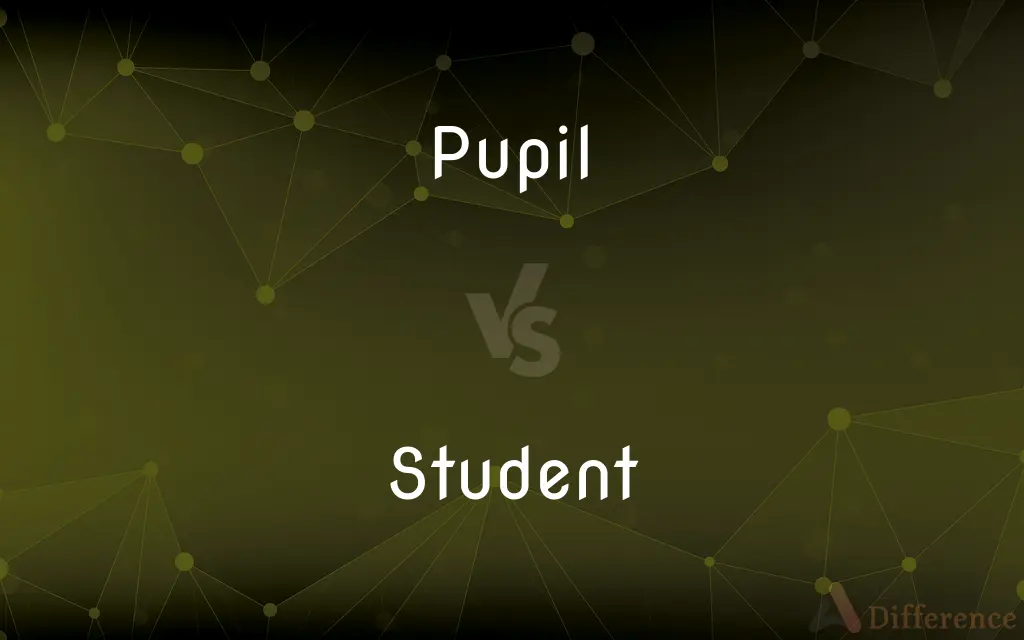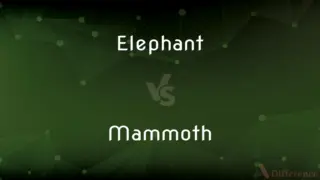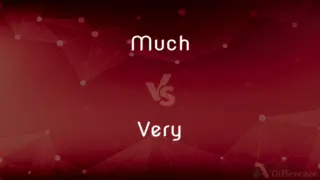Pupil vs. Student — What's the Difference?
By Tayyaba Rehman — Updated on October 25, 2023
A "Pupil" typically refers to a young learner, often in elementary or primary school, while a "Student" is a broader term for anyone actively engaged in learning, irrespective of age.

Difference Between Pupil and Student
Table of Contents
ADVERTISEMENT
Key Differences
A "Pupil" is commonly used to describe a young person who is learning under the guidance of a teacher, especially within the context of elementary or primary education. This term denotes someone in the early stages of their educational journey, often before they reach secondary school.
Contrastingly, "Student" is a more comprehensive term. It encompasses individuals of all ages who are engaged in the learning process. This could be in elementary school, high school, college, or even adult education classes. The term is versatile and can apply to someone studying art, science, languages, or any other subject.
The distinction between "Pupil" and "Student" is subtle but important. In general conversation, if someone refers to a pupil, it's typically understood that they're talking about a younger individual, possibly in primary school. On the other hand, if someone is discussing a student, the age or level of education is less definitive, and context becomes crucial.
In certain contexts, the terms might be used interchangeably. For instance, a teacher in an elementary school might refer to her class as students. However, the inherent difference remains: "Pupil" hints at a younger, school-aged individual, while "Student" is more encompassing.
In some regions or educational systems, the differentiation between the terms may be more pronounced, with "Pupil" strictly referring to younger learners and "Student" to older ones. However, in a broader sense, any pupil can be a student, but not every student is necessarily a pupil.
ADVERTISEMENT
Comparison Chart
Definition
A young learner in primary or elementary school
Any individual actively engaged in learning
Age Group
Typically younger, pre-secondary school
Any age, from young to old
Educational Level
Elementary or primary
Any level, from elementary to postgraduate
Context
More specific to early schooling
Broader, encompassing all educational levels
Dependency
Often implies a direct relation to a teacher
Can be independent or self-study
Compare with Definitions
Pupil
Someone under the direct supervision of a teacher
The music instructor introduced his new Pupil.
Student
An individual enrolled in an educational institution
The university has over 10,000 Students.
Pupil
The contractile aperture in the center of the iris of the eye
The doctor checked the Pupil's response to light.
Student
An attendant or follower of a teacher
He was a devoted Student of the spiritual guru.
Pupil
A child in primary or elementary education
The school has 300 Pupils enrolled this year.
Student
Someone studying a particular subject
He's a Student of human behavior.
Pupil
A person receiving instruction
She was the favorite Pupil of the renowned artist.
Student
A person who pursues knowledge or skills
As a Student of the culinary arts, she traveled to Italy.
Pupil
A young person attending school
The teacher praised the Pupil for her diligence.
Student
A student is primarily a person enrolled in a school or other educational institution and who is under learning with goals of acquiring knowledge, developing professions and achieving employment at desired field. In the broader sense, a student is anyone who applies themselves to the intensive intellectual engagement with some matter necessary to master it as part of some practical affair in which such mastery is basic or decisive.
Pupil
The pupil is a black hole located in the center of the iris of the eye that allows light to strike the retina. It appears black because light rays entering the pupil are either absorbed by the tissues inside the eye directly, or absorbed after diffuse reflections within the eye that mostly miss exiting the narrow pupil.
Student
One who is enrolled or attends classes at a school, college, or university.
Pupil
A student under the direct supervision of a teacher or professor.
Student
One who studies something
A student of contemporary dance.
Pupil
(Law) A minor under the supervision of a guardian.
Student
An attentive observer
A student of world affairs.
Pupil
The apparently black circular opening in the center of the iris of the eye, through which light passes to the retina.
Student
A person who studies or learns about a particular subject.
She is a student of human interactions.
He is a student of life.
Pupil
A learner at a school under the supervision of a teacher.
Student
A person who is formally enrolled at a school, a college or university, or another educational institution.
The students were out raising funds for rag week.
Pupil
One who studies under supervision of a renowned expert in their field.
Plato was Socrates' pupil, and in turn Aristotle was Plato's pupil.
Student
(in particular) A person who is enrolled at a college or university primary]] or secondary school.
Pupil
An orphan who is a minor and under the protection of the state.
Student
A person engaged in study; one who is devoted to learning; a learner; a pupil; a scholar; especially, one who attends a school, or who seeks knowledge from professional teachers or from books; as, the students of an academy, a college, or a university; a medical student; a hard student.
Keep a gamester from the dice, and a good student from his book.
Pupil
(anatomy) The hole in the middle of the iris of the eye, through which light passes to be focused on the retina.
Student
One who studies or examines in any manner; an attentive and systematic observer; as, a student of human nature, or of physical nature.
Pupil
(zoology) The central dark part of an ocellated spot.
Student
A learner who is enrolled in an educational institution
Pupil
The aperture in the iris; the sight, apple, or black of the eye. See the Note under Eye, and Iris.
Student
A learned person (especially in the humanities); someone who by long study has gained mastery in one or more disciplines
Pupil
A youth or scholar of either sex under the care of an instructor or tutor.
Too far in years to be a pupil now.
Tutors should behave reverently before their pupils.
Student
A person actively engaged in learning
She was a lifelong Student of literature.
Pupil
A person under a guardian; a ward.
Pupil
A boy or a girl under the age of puberty, that is, under fourteen if a male, and under twelve if a female.
Pupil
A learner who is enrolled in an educational institution
Pupil
Contractile aperture in the iris of the eye
Pupil
A young person attending school (up through senior high school)
Common Curiosities
What age group does the term Pupil generally refer to?
Pupil typically refers to a younger individual, often in elementary or primary school.
Is the term Student restricted to college-goers?
No, Student is a broad term that applies to learners of all ages and educational levels.
Does Pupil have meanings beyond education?
Yes, Pupil can also refer to a part of the eye.
Does the term Pupil always imply a formal teacher-student relationship?
Typically, yes. Pupil often suggests someone under direct instruction or guidance.
Can a high school attendee be termed a Pupil?
While "Pupil" often implies younger learners, context varies, and in some places, a high school attendee might be termed a Pupil.
Is every Pupil a Student?
Yes, every Pupil is a Student, but not every Student is necessarily a Pupil.
Can a self-taught individual be called a Student?
Absolutely, a self-taught individual can be termed a Student of a particular subject or skill.
Can an adult attending night school be a Pupil?
While possible, the term Student is more commonly used for adults in learning settings.
Can Student refer to someone learning outside of an institution?
Yes, a person actively engaged in learning, even outside formal settings, can be termed a Student.
Which term is more encompassing, Pupil or Student?
Student is more encompassing, covering all learners irrespective of age.
Can the terms be used interchangeably?
While there's overlap, context matters. Pupil usually implies younger learners, while Student is broader.
Is Pupil used in British English differently than American English?
Usage can vary, but in both, Pupil often implies a younger learner.
Do the terms have different origins?
Both terms have Latin origins, with "Pupil" coming from "pupillus" and "Student" from "stūdent-".
In what settings is Student most commonly used?
Student is widely used across educational settings, from schools to universities to informal learning contexts.
Which term is older in usage, Pupil or Student?
Both terms have ancient origins, but "Pupil" in the sense of a young learner has been used since the 14th century.
Share Your Discovery

Previous Comparison
Elephant vs. Mammoth
Next Comparison
Much vs. VeryAuthor Spotlight
Written by
Tayyaba RehmanTayyaba Rehman is a distinguished writer, currently serving as a primary contributor to askdifference.com. As a researcher in semantics and etymology, Tayyaba's passion for the complexity of languages and their distinctions has found a perfect home on the platform. Tayyaba delves into the intricacies of language, distinguishing between commonly confused words and phrases, thereby providing clarity for readers worldwide.














































